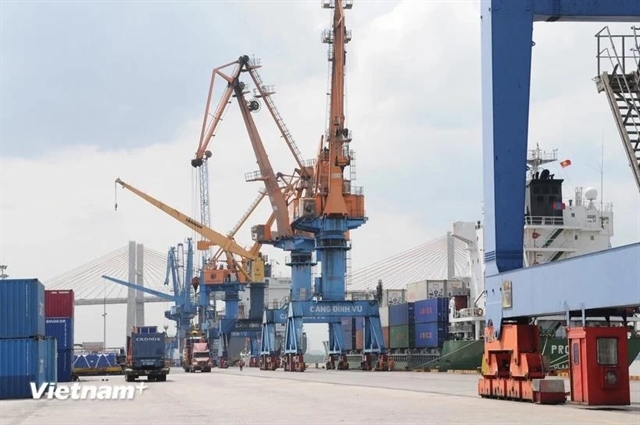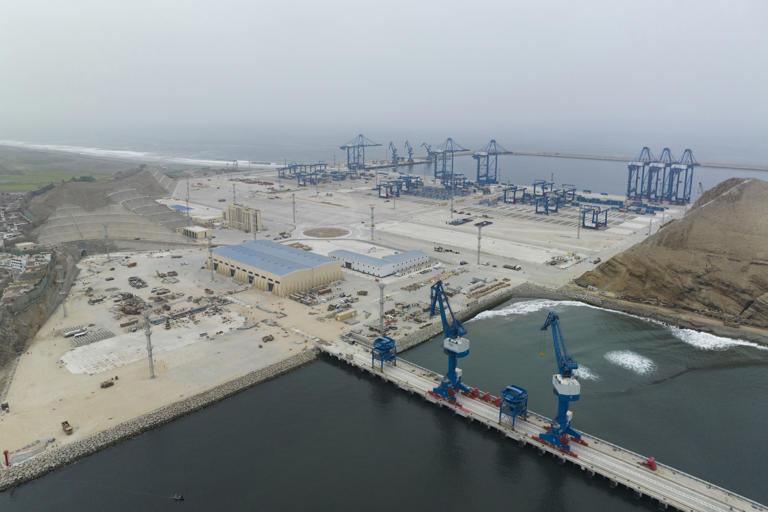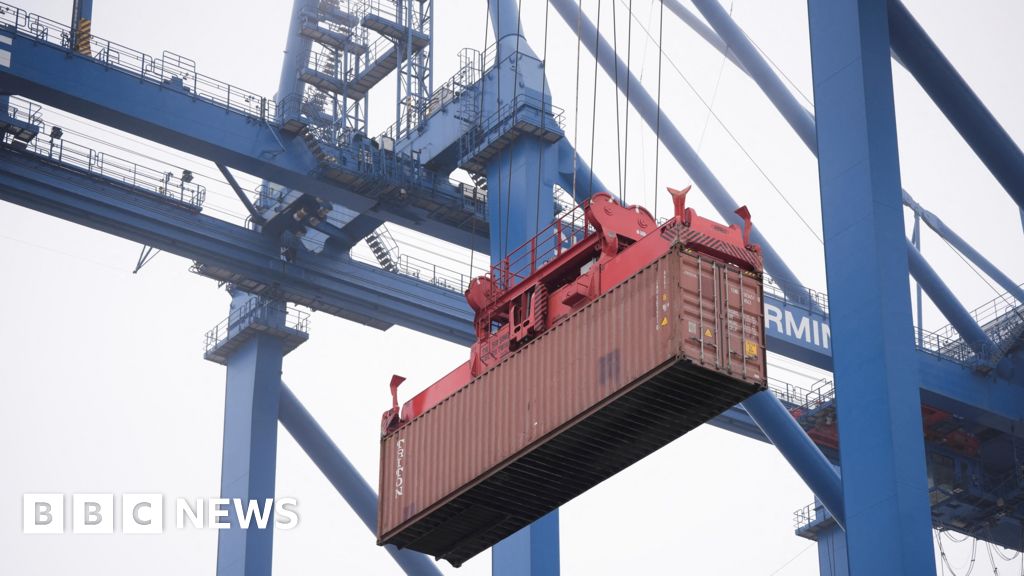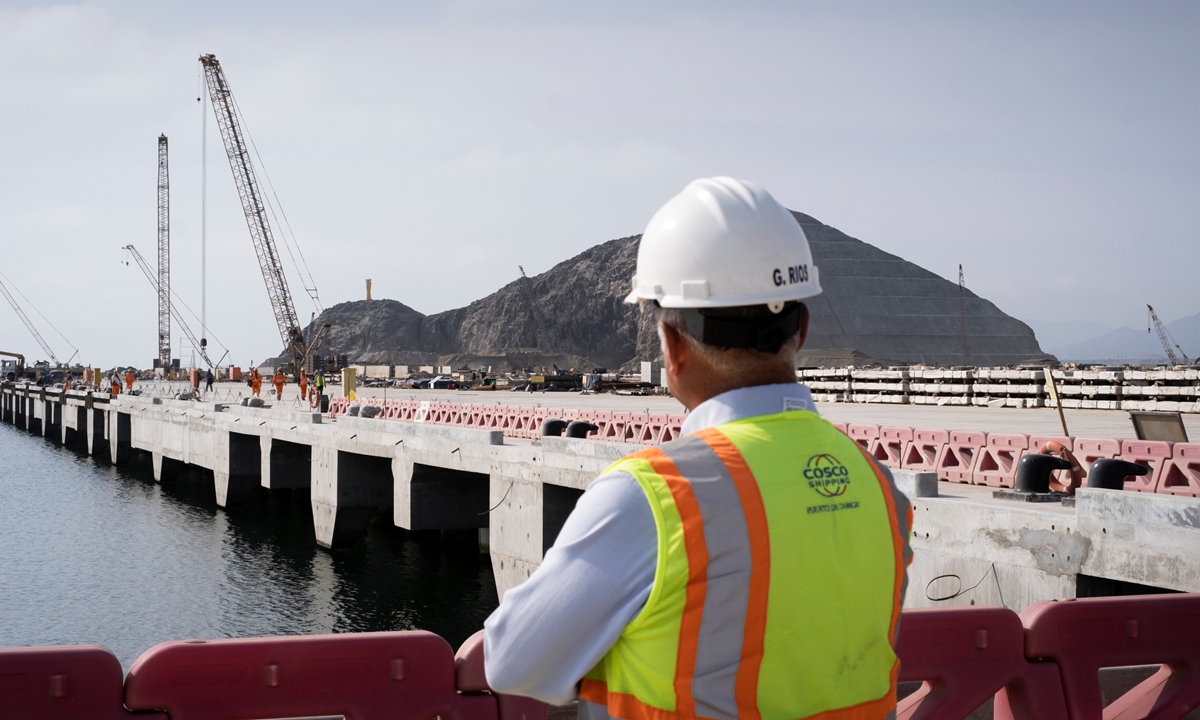






/tpg%2Fb54a8609-2df8-43db-96b1-6d4eba753bd2.jpeg)
/tpg%2F4c8b0930-1496-4ea7-bc73-1f1b9fb94a74.jpeg)
/tpg%2Ff0a3129a-366f-4b50-9f17-2a72efb1d5f5.jpeg)






On November 14, 2024, Chinese President Xi Jinping inaugurated the Chancay Megaport near Lima, Peru, a pivotal project funded by China's Belt and Road Initiative (BRI) at a cost of $3.5 billion, with $1.3 billion sourced from the Chinese government. This state-of-the-art port, which can accommodate vessels of up to 18,000 TEUs, is designed to significantly enhance trade ties between China and Peru, reducing shipping times from Shanghai to Peru by 10 to 12 days and lowering logistics costs by over 20% [6f8aa434][7b67ac61]. The port is projected to handle one million containers annually, generating $4.5 billion and representing approximately 1.8% of Peru's GDP, while creating over 8,000 jobs, underscoring its importance for connecting Asia and Latin America [6f8aa434][5d701036]. Peruvian President Dina Boluarte expressed national pride in the project, highlighting Peru's role in global transshipment [1f197aa7].
During the APEC summit in October 2024, Xi discussed the port's role in facilitating faster shipping and improving bilateral trade, which reached nearly $36 billion in 2023. China's exports to Peru grew by 12.3% to $11.32 billion in the first ten months of 2024, while imports from Peru increased by 16.2% to $24.5 billion [d2ece873][7b67ac61]. Notably, China's crane exports to Latin America surged, with a 132% increase to Peru in October 2024 and a 76% rise to $143 million in the first ten months of the year. Exports to Mexico rose by 193% year on year, reflecting the broader trade diversification linked to the BRI and the expansion of port capacity for exports to the U.S. [2062c001]. The Chancay Megaport is anticipated to handle up to one million containers in its first year and boasts a maximum depth of 17.8 meters to accommodate large container ships [87f8f48a]. The inauguration coincided with an updated free trade agreement that favors Peru's exports, particularly as the country is now recognized as free of foot-and-mouth disease, allowing for meat exports to China [5d701036].
However, the port's inauguration has raised concerns among local residents, particularly fishermen, who fear the loss of fishing waters and diminished fishing stocks. Fishermen like Julius Caesar and Rafael Ávila have voiced frustrations over potential pollution from large container ships and the lack of economic benefits for the local community [b7c4814a]. Local protests have emerged over concerns about environmental impacts and the adequacy of public services in the surrounding areas, as property prices in Chancay have surged from $2 to $35 per square meter [23e1b10f].
U.S. military officials, including Army General Laura Richardson, have expressed concerns regarding the potential for Chinese military use of the port and the broader implications of Chinese influence in Latin America [6f8aa434]. Analysts suggest that the U.S. has neglected the region, allowing China to gain significant influence. This shift comes at a time when Latin American leaders are wary of U.S. pressure, especially under the incoming president-elect Trump, who may seek to renegotiate trade agreements [d2ece873].
Brazilian officials are already planning integration routes to utilize Chancay, but challenges such as long distances and infrastructure inefficiencies could impede immediate benefits [aa72d3e1][31ebc020]. The exclusivity agreements that grant Cosco significant control over port operations have raised alarms about the implications of such foreign investments on Peru's sovereignty and infrastructure management [6c177fca]. Peru's Foreign Minister, Javier González-Olaechea, has called for increased U.S. investment to balance China's growing influence, emphasizing the need for a diverse investment landscape [6c177fca].
As trade between China and Latin America reached $485.7 billion in 2023, a 7.7% increase, the geopolitical dynamics are shifting, with countries like Peru tightening tax regulations on imports while balancing relations with both the U.S. and China [a9823a8f]. Xi has also promoted cultural exchanges to strengthen ties further, underscoring the multifaceted nature of China's influence in the region [a9823a8f]. Experts warn of potential economic ramifications for South America if the Chancay Megaport becomes a critical link in China's trade network, especially as Brazil's trade figures stand at $104.32 billion in exports and $53.17 billion in imports [aa72d3e1]. The first commercial vessel is set to transport Peruvian fruits to China, symbolizing the operational launch of this strategic port [1f197aa7].
The Chancay port is also seen as a strategic move by China to create an alternative shipping route to the U.S. amid ongoing trade tensions, particularly with the Biden administration's tariffs on imports. Cosco Shipping Ports, which acquired 60% of the port in 2019 for $225 million, has invested heavily in upgrades to facilitate this shift [783a003f]. U.S. trade adviser Mauricio Claver-Carone indicated that a 60% tariff would apply to goods passing through Chancay, reflecting the ongoing complexities of U.S.-China trade relations [783a003f]. Chinese manufacturers are reportedly relocating to avoid U.S. tariffs, using 'bathing bases' in countries like Vietnam and Mexico, which further complicates the trade landscape [783a003f].
In addition to its implications for China and Peru, the Chancay Megaport is poised to open new opportunities for Vietnam's import-export and logistics sectors. With its strategic location and capacity to handle 1.5 million TEUs annually, the port is expected to reduce shipping times to Latin America by up to 50%, potentially saving logistics costs by 20%. Vietnam's trade with Latin America reached $20.6 billion last year, with forecasts suggesting trade growth could reach 10% annually with improved logistics [858edf0e]. This development highlights the interconnectedness of global trade networks and the potential for emerging markets like Vietnam to benefit from infrastructure investments in other regions [858edf0e].
The Chancay port signifies a shift in Latin America's geopolitical landscape, challenging U.S. influence. As the first ship from Chancay to China is set to sail this week, the port aims to shorten shipping time from 35 to 23 days and is nearly fully automated, designed to withstand earthquakes. This project is seen as a gateway for Brazilian exports to Asia, with Peru's government aspiring to become a key transit point for Latin American trade to Asia [e35dfcea].
The opening of Chancay Port, which is 60%-owned by COSCO Shipping, is expected to further reduce shipping times between China and South America by 10 days, reinforcing Peru's ambition to become 'the Singapore of Latin America.' However, concerns have been raised regarding COSCO's exclusive rights and the amendments to Peru's National Port System Law that facilitate this arrangement. With over $286 billion in Chinese infrastructure projects across Latin America, the U.S. risks losing its influence as China fills critical infrastructure gaps. Experts emphasize the need for the U.S. to revamp its economic engagement strategy to counter China's growing presence in the region, calling for a more integrated approach with allies to address this urgent challenge [66effa9b].